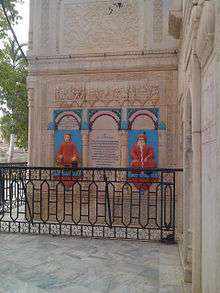Sri Chand
Sri Chand Ji, also referred to as Baba Sri Chand (8 September 1494 – 13 January 1629),[1][2] was the founder of the ascetic sect of Udasi and was the elder son of Guru Nanak, first Guru and founder of Sikhism.[3] He was born to Mata Sulakhani on Bhadra sudi 9, 1551 Bikrami (i.e. 8 September 1494).
Compositions
Sri Chand Ji is said to have composed an Aarta – a poem in name of his father, Guru Nanak Dev Ji. Many of his compositions are known to be part of the Udasi scripture, Matra Sahib. The 17th Ashtapadi of Sukhmani Sahib is said to have been composed by Sri Chand on the occasion of a visit by Guru Arjan.
Relationship with Sikh Gurus
Not much is known about the relationship of Guru Angad and Sri Chand.
Guru Amardas declared active and domestic sikhs to be separate from passive and recluse Udasis[4] .
However the Sikh Gurus, Guru Amardas, Guru Ramdas, Guru Arjan and Guru Hargobind who were also contemporaries of Sri Chand did revere him.
Guru Hargobind's eldest son joined Udasi, while Sri Chand was alive.
Ram Rai, son of Guru Har Rai joined Udasi sect after a failed attempt of being a official eighth Guru of the Sikhs.
Sikh organizations like the Nihangs, Damdami Taksal and even some Jathedars of Takhts, have admired Sri Chand Ji.
Death
He reportedly died at Kiratpur on 13 January 1629. However this appears unlikely, as if true that would meant he lived to 134 years old; the oldest human on record only lived 122 years.
References
- ↑ Gurnek Singh. "Sri Chand JI". Encyclopaedia of Sikhism. Punjabi University Patiala. Archived from the original on 8 May 2014. Retrieved 24 August 2014.
- ↑ "The Encycopaedia of Sikhism, vol. IV, S-Z". archive.org. p. Sri Chand, Baba. Retrieved 26 July 2017.
- ↑ Baba Sri Chand Sikh-heritage.co.uk.
- ↑ Cunningham,Joseph A History of the Sikhs
Bibliography
- O. P. Ralhan (2004). Srichandraji Maharaj. Anmol Publications. ISBN 978-81-261-1828-1.
